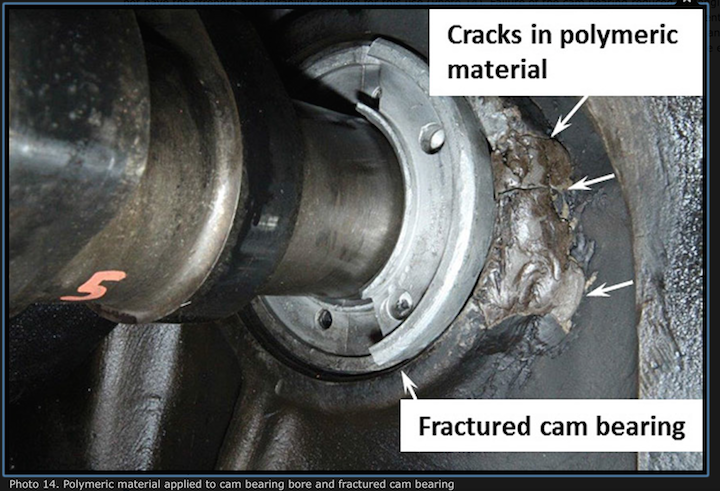Today the Transportation Safety Board of Canada (TSB) released its final report on the July 6th, 2013 train derailment in Lac-Megantic, Quebec. The report produced a strong reaction from Keith Stewart, Greenpeace Canada’s Climate and Energy Campaign coordinator.
“This report is a searing indictment of Transport Canada’s failure to protect the public from a company that they knew was cutting corners on safety despite the fact that it was carrying increasing amounts of hazardous cargo. This lax approach to safety has allowed the unsafe transport of oil by rail to continue to grow even after the Lac Megantic disaster. It is time for the federal government to finally put community safety ahead of oil and rail company profits or we will see more tragedies, Stewart said.”
Throughout the report there is ample evidence to support Stewart’s position and plenty to show why the people of Lac-Megantic want the CEO of Montreal, Maine & Atlantic Railway (MMA), the rail company responsible for the accident, held accountable in place of the engineer and other low level employees currently facing charges.
At the press conference for the release of the report the TSB representatives often noted that they had found 18 factors that contributed to the actual crash and they were not willing to assign blame to anyone, claiming that wasn’t their role.
But several critical factors stand out and they are the result of MMA putting profits ahead of safety and Transport Canada (TC), the Canadian regulators responsible for overseeing rail safety, failing to do its job.
Engine Fire
The issue that set the whole chain of events into motion on July 6th was an engine fire in the unattended locomotive. As usual the engineer had left the train unattended with one locomotive running while shutting off the others. This locomotive supplied power to the air braking system. The locomotive caught on fire, the fire department was called and they put out the fire and shut off the locomotive in the process.
Today’s TSB report notes that the fire was due to an improper repair of a cam bearing. Instead of doing a costly replacement, the cam bearing was repaired with epoxy (polymeric material). As the report states:
This temporary repair had been performed using a polymeric material, which did not have the strength and durability required for this use.
Braking Failure
Once the locomotive was shut down due to the fire, it could no longer power the air brake system.
As previously reported on DeSmogBlog, this type of system has been described as “19th century technology” by a rail safety expert at the Federal Railroad Administration but as a whole the rail industry has not upgraded to newer technologies because of the costs involved.
Without power to the air braking system, the braking system lost pressure over time and the train began to roll towards Lac-Megantic.
This wouldn’t have been an issue if the proper number of handbrakes had been applied. But the engineer had not applied enough handbrakes because he had not performed the hand brake effectiveness test properly and had left the locomotive air brakes on while conducting the test. The report notes the lack of training and oversight for that particular locomotive engineer (LE).
Furthermore, the LE was never tested on the procedures for performing a hand brake effectiveness test, nor did the company’s Operational Tests and Inspections (OTIS) Program confirm that hand brake effectiveness tests were being conducted correctly.
The report also notes that when MMA employees were tested for safety knowledge, they could take the tests home.
Requalification typically consisted of 1 day to complete the exam, and did not always involve classroom training. On many occasions, employees would take the exam home for completion.
However, in this case, there were not even questions on the test on this critical subject.
They did not have questions on the hand brake effectiveness test, the conditions requiring application of more than the minimum number of hand brakes, nor the stipulation that air brakes cannot be relied upon to prevent an undesired movement.
And they found this had been the situation since before the oil trains starting running.
Since 2009, no employee had been tested on CROR 112(b), which targeted the hand brake effectiveness test. In 2012, U.S. employees had been tested twice on that rule; both tests had resulted in a “Failure”.
Single Operator Risks
The report goes into detail about how MMA came to be operating oil trains with only one crew member. And while ultimately the regulators failed, some did raise flags about this. When MMA initially sought to move to single person train operations (SPTO) from the standard two person crew, it was noted that there were significant issues with their operations.
In July 2009, TC expressed a number of concerns that centred on deficiencies in MMA operations, including lack of consultation with employees in doing risk assessments, problems managing equipment, problems with remote-control operations, issues with rules compliance, issues with fatigue management, and a lack of investment in infrastructure maintenance.
Additionally the report notes that Transport Canada’s Quebec office expressed specific concerns in 2010.
TC Quebec Region reiterated its concern about MMA’s suitability as an SPTO candidate.
And yet despite the concerns and MMA’s poor track record, in 2012 they were allowed to start running single crew trains despite TC Quebec still expressing concern.
In February 2012, TC met with MMA and the RAC. TC advised MMA that TC did not approve SPTO. MMA only needed to comply with all applicable rules and regulations. TC Quebec Region remained concerned about the safety of SPTO on MMA.
Unsurprisingly, the additional training for employees who would be operating trains on their own was almost non-existent. And it was focused on the fact that for safety purposes, engineers were allowed to stop the trains and take naps.
The actual SPTO training for several LEs, including the accident LE, consisted of a short briefing in a manager’s office on the need to report to the RTC every 30 minutes, on the allowance for power naps, and on the need to bring the train to a stop to write clearances.
This report is a clear indictment of a system that allows for corporate profit over public safety. However, what also is clear from today’s press conference and from the regulatory situation in the United States is that nothing of significance has changed regarding the movement of oil by rail in the US and Canada.
A poorly maintained locomotive can still be left running and unattended. There still is no formal regulation on how many hand brakes need to be applied to secure a train.
Single person crews are still allowed and Burlington Northern Santa Fe, the company moving the most oil-by-rail in the U.S., is working to implement this as a practice despite the objections of the employees.
In short, the corporate profit before public safety approach is still standard operating procedure. And the oil trains are expected to return to the tracks through Lac-Megantic within a year.
Train tracks where the ill-fated train was parked. (c) Justin Mikulka.
Image Credit: Transportation Safety Board via flickr.
Subscribe to our newsletter
Stay up to date with DeSmog news and alerts








